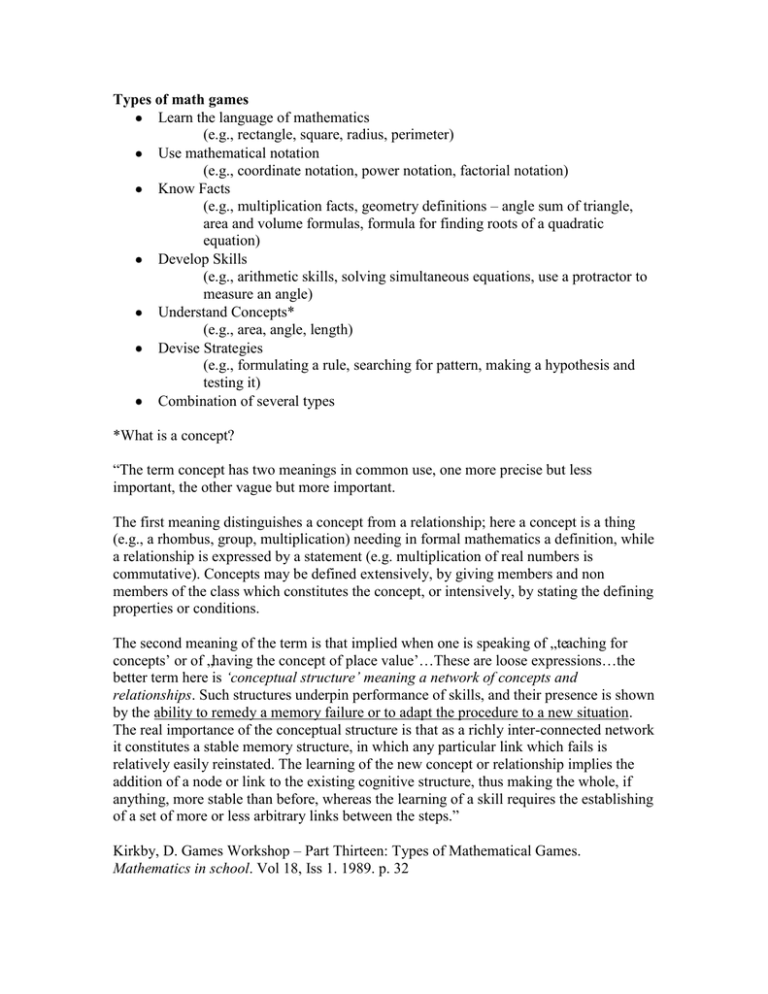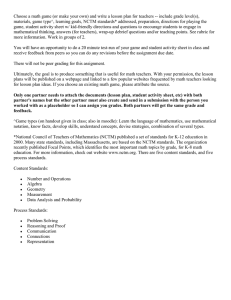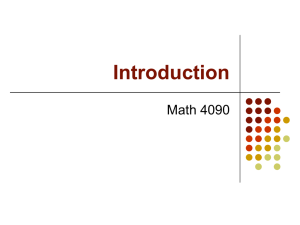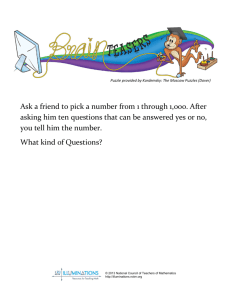Types of math games Learn the language of mathematics Use mathematical notation
advertisement

Types of math games Learn the language of mathematics (e.g., rectangle, square, radius, perimeter) Use mathematical notation (e.g., coordinate notation, power notation, factorial notation) Know Facts (e.g., multiplication facts, geometry definitions – angle sum of triangle, area and volume formulas, formula for finding roots of a quadratic equation) Develop Skills (e.g., arithmetic skills, solving simultaneous equations, use a protractor to measure an angle) Understand Concepts* (e.g., area, angle, length) Devise Strategies (e.g., formulating a rule, searching for pattern, making a hypothesis and testing it) Combination of several types *What is a concept? “The term concept has two meanings in common use, one more precise but less important, the other vague but more important. The first meaning distinguishes a concept from a relationship; here a concept is a thing (e.g., a rhombus, group, multiplication) needing in formal mathematics a definition, while a relationship is expressed by a statement (e.g. multiplication of real numbers is commutative). Concepts may be defined extensively, by giving members and non members of the class which constitutes the concept, or intensively, by stating the defining properties or conditions. The second meaning of the term is that implied when one is speaking of „teaching for concepts‟ or of „having the concept of place value‟…These are loose expressions…the better term here is ‘conceptual structure’ meaning a network of concepts and relationships. Such structures underpin performance of skills, and their presence is shown by the ability to remedy a memory failure or to adapt the procedure to a new situation. The real importance of the conceptual structure is that as a richly inter-connected network it constitutes a stable memory structure, in which any particular link which fails is relatively easily reinstated. The learning of the new concept or relationship implies the addition of a node or link to the existing cognitive structure, thus making the whole, if anything, more stable than before, whereas the learning of a skill requires the establishing of a set of more or less arbitrary links between the steps.” Kirkby, D. Games Workshop – Part Thirteen: Types of Mathematical Games. Mathematics in school. Vol 18, Iss 1. 1989. p. 32 Assignment: Design a Math Game Due Nov. 13, test run in class on Nov 6** **The presentation day will function to “test” the games and student activity sheets before you submit the final written version on Nov 13.** Choose a math game (or make your own) and write a lesson plan for teachers – include grade level(s), materials, learning goals, NCTM standards^ correlation, preparation, directions for playing the game, student activity sheet w/ kid-friendly directions and questions to encourage students to engage in mathematical thinking, answers (for teachers), wrap-up debrief questions and/or teaching points. Work in groups of 2. Ultimately, the goal is to produce something that is useful for math teachers. The lesson plans will be “published” on a webpage and linked to a few popular websites frequented by math teachers looking for lesson plan ideas. ^*National Council of Teachers of Mathematics (NCTM) published a set of standards for K-12 education in 2000. Many state standards, including Massachusetts, are based on the NCTM standards. The organization recently published Focal Points, which identifies the most important math topics by grade, for K-8 math education. For more information, check out website www.nctm.org. There are basically five content standards, and five process standards. Content Standards: Number and Operations Algebra Geometry Measurement Data Analysis and Probability Process Standards: Problem Solving Reasoning and Proof Communication Connections Representation Rubric: Based on your reading and your own thoughts, what are elements of good math games? What are elements of a good lesson plan and student activity sheet to make the most of a particular math game? MIT OpenCourseWare http://ocw.mit.edu 11.124 Introduction to Education: Looking Forward and Looking Back on Education Fall 2011 For information about citing these materials or our Terms of Use, visit: http://ocw.mit.edu/terms.


